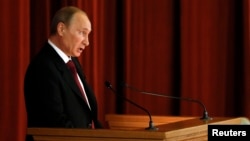Russia’s president heaped criticism on Ukraine’s leader for ending a cease-fire in the ongoing stand-off between Ukrainian forces and pro-Moscow separatists in eastern Ukraine.
Speaking in Moscow, Vladimir Putin said that he and his “European colleagues” tried unsuccessfully to persuade Petro Poroshenko to extend the truce, referring to discussions he and the Ukrainian leader had by telephone with German Chancellor Angela Merkel and French President Francois Hollande.
“Unfortunately President Poroshenko took the decision to restart military operations and we - I mean myself and my European colleagues - could not convince him that the road to stable, strong and long-lasting peace does not lie through war,” said Putin Tuesday before a gathering of Russian diplomats.
The German and French leaders did reportedly press for an extension of the truce, but Poroshenko is seen to have made his decision largely under internal pressure. On Sunday, thousands of Ukrainians rallied before his office in Kyiv demanding an end to the cease-fire he had announced nine days earlier in hopes of getting separatist rebels to disarm, return seized border posts and hold peace talks.
Some of the rebels heeded the truce but it quickly fell apart. According to Ukraine’s Foreign Ministry, 27 Ukrainian servicemen were killed and 69 wounded while the ceasefire was in force.
Poroshenko said in an early morning statement Tuesday that Ukraine had not seen "concrete steps [on Russia’s part] for de-escalating the situation, including strengthening controls on the border."
Both Kyiv and the West accuse Moscow of supporting the separatist movement in eastern Ukraine with fighters and military hardware, a charge Moscow denies.
In his speech, Putin attributed the roots of tensions in eastern Ukraine to the alleged suppression of rights of ethnic Russians and Russian-speakers, the same pretext he used to justify Russia’s annexation of Ukraine’s Crimea in March.
“In Ukraine, as you saw, our compatriots found themselves threatened, Russian people and people of other nationalities, their language, history, culture, legal rights - guaranteed, supposedly, by European conventions,” said Putin.
Citing the Crimean scenario, Putin said Russia had been given no alternatives.
“What kind of reaction did our partners expect from us when events unfolded in Ukraine? We certainly had no right to leave Crimeans or the people of Sevastopol (base of Russia's Black Sea Fleet) at the mercy of militant nationalists and radicals,” said Putin using terms frequently wielded by Russian officials and media outlets when describing Ukrainians aligned with the government in Kyiv.
Had Russia not acted, Putin said, “fairly soon, I think, we would have seen NATO troops arrive.”
Speaking about broader geopolitical tensions, Putin seemed to blame them on a general disintegration of international order.
“There is growing potential for conflict, seriously exacerbated by old and newly provoked contradictions.... Unfortunately, we see that international law does not work, basic norms of decency are not met, and that lawlessness triumphs,” said Putin.
Putin made no direct references to the United States but cautioned in general against “meddling in the affairs of sovereign states….”
Referring to conflicts in other parts of the world, he called for steps toward their containment.
“We need some kind of safety net around all of Europe so that the Iraqi, Libyan, Syrian - and unfortunately we have to mention the Ukrainian - scenarios do not become a contagious disease,” Putin said.





